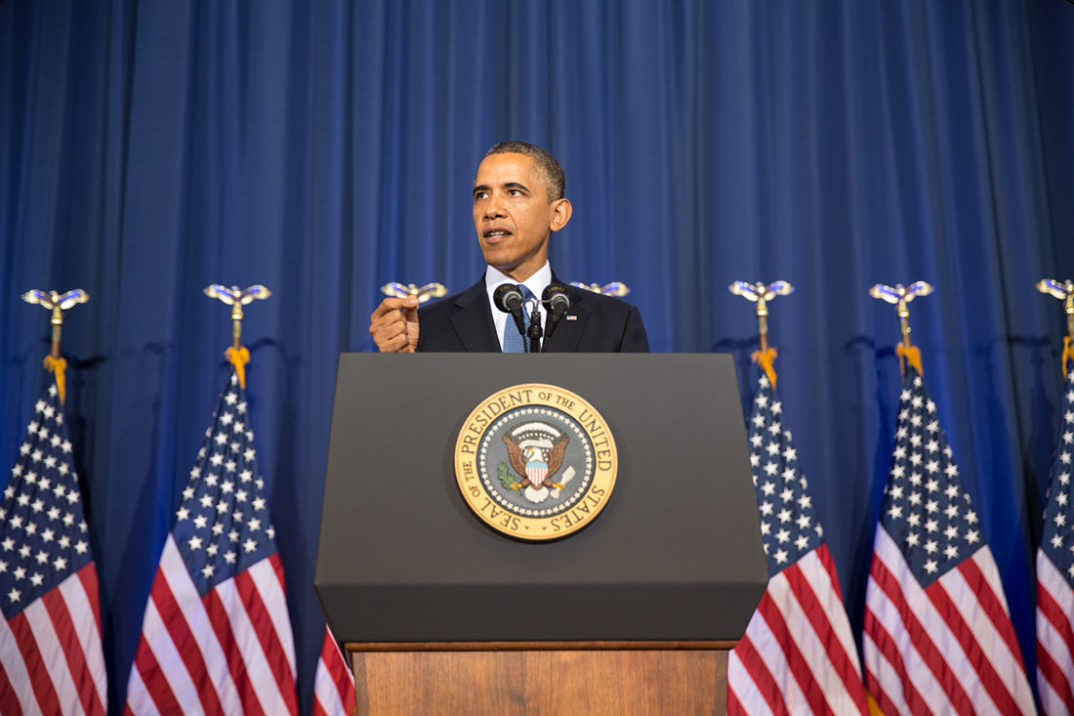Was Obama Truly a Post-Racial President?
“There is not a liberal America and a conservative America—there is the United States of America. There is not a Black America and a White America and Latino America and Asian America… there’s the United States of America.” These words were pronounced by Barack Obama in the 2004 Democratic Convention. A relatively obscure politician at the time, this speech proved to be momentous, as it struck a chord with American voters, and four years later, Obama was the first African American president elected in U.S. history.
During his campaign, Obama never explicitly said “Vote for me because I am black.” It would be unfair to accuse him of having played the race card. Yet, some prominent figures (politicians, athletes, entertainers) unmistakably confessed to having voted for Obama, simply because he was black. To these voters, identity came before ideology in politics, and indeed, this paved the way for the further development of identity politics in America, to truly abusive levels.
But in fairness, Obama seemed to have no interest in identity politics, and very much in line with his original speech at the 2004 Democratic convention, he tried to portray himself as the promise for a post-racial America. However, this turned out to be a paradox, as social commentator Shelby Steele observed in a sharp analysis of Obama’s candidacy.
Steele rightly observed that only a black candidate could deliver the promise of a post-racial America. A white candidate promising to overcome ethnic divisions would not have been credible; many promises of ending racism have been made in the past, and they have not come true. The paradox, thus, was that Obama tried to portray himself as a post-racial candidate, but in order to do so, he had to go deeper in developing a black identity that, at first, he did not care much for.
We now know that he actually went to great lengths to achieve so, as Pulitzer Prize winner David J. Garrow’s recently released Rising Star: The Making of Barack Obama makes clear. Garrow is a long time liberal, so no one can accuse him of attempting Obama’s character assassination. Garrow recounts how Obama was romantically involved with Sheila Jager, a woman of Japanese and Dutch descent. This was no insignificant relationship; Obama toyed with the idea of proposing marriage to her. But, ultimately, Obama decided to end the relationship, because he was very concerned that a white spouse would be an obstacle to a career in politics. From very early on, he had presidential ambitions, and he seemed to understand very well that his only chance of making it to the White House would be by fully embracing an African American identity.
Obama would now choose a black spouse, and he would tell stories about himself as a sort of civil rights leader who had to undergo the ordeal of racism prior to his political ascendency. This is the image that he tries to present in his autobiographical Dreams from My Father, but Garrow appropriately debunks it. In Garrow’s portrayal, prior to his arrival to the Illinois political scene, Obama did not care much about African American issues, and was rather a conformist with the system.
The somewhat artificial embrace of black identity for political gain worked well with the black vote, as Obama proved to be immensely popular in the African American community. But, of course, this move also capitalized on the white vote, which ultimately took him to power. Shelby Steele has convincingly argued that white guilt played a considerable role in Obama’s rise.
In a sizable sector of American society (especially the liberal sphere), there is a major fear of being accused of racism. Whites have pursued all sorts of strategies to avoid this shaming label. Infamously, many whites have adopted the “some of my best friends are black” defense, as if having a single black friend all of a sudden will make racism disappear, and get privileged whites off the hook.
Strangely, “I voted for Obama” became the new “some of my best friends are black.” Slavery and Jim Crow are the two greatest sources of historical embarrassment to white Americans. What better way to atone for the grave sins of the past, than to vote for a black candidate? After Obama, so the feeling went, no one would accuse America of being a racist country because, finally, there would be a black president. Furthermore, this time, it would be relatively easy to vote for the black candidate, as Obama, unlike a Jesse Jackson, appeared to be a much milder candidate when it came to confrontation, inasmuch as he assumed a post-racial stance (but, of course, it could not truly be post racial).
From an ethical perspective, this has turned out to be problematic on at least two grounds. First, by making cold identity calculations out of political ambitions, and not out of real concerns, Obama failed to be a truly post-racial president. The United States remains as divisive as ever when it comes to racial relations. His promise to unite all groups, on the basis that “there is not a Black America and a White America and Latino America and Asian America… there’s the United States of America,” fell short. But, in truth, his promise never had much of a chance, because from the beginning, his own political rise was built on identity politics, although subtly so. Yet, no matter how subtle it may be, identity politics is incompatible with the promise of a post-racial America.
Second, more worryingly, Obama did get a free pass on many things that, had they been done by a white politician, liberals and leftists would have been much tougher on him. Prior to his presidency, he was very critical of the Patriot Act; once in power, he increased abusive surveillance to unprecedented levels, as Edward Snowden has reminded us multiple times. He engaged in illegal drone operations targeting alleged terrorists, with atrocious collateral damage. He bailed out banks. He deported more immigrants than any other U.S. President in history.
The neoconservative right obviously would have no issue with these policies, so they remained silent. But strangely, most of the liberal left also remained silent. Why? We can’t help but wonder if Obama’s skin color had something to do with it. A leftist or liberal critic would be too afraid of being accused of racism when criticizing Obama. The fact that he became the first African American President seemed to be more important.
Indeed, the only significant criticism from the left that could not be cheaply accused of being racist, came only come from black intellectuals. Cornel West was courageous enough to overcome identity politics and point out Obama’s moral imperfections. But, indeed, the fact that only a black intellectual could legitimately criticize the abuses of a black president, proves that that President was far from being post-racial.





